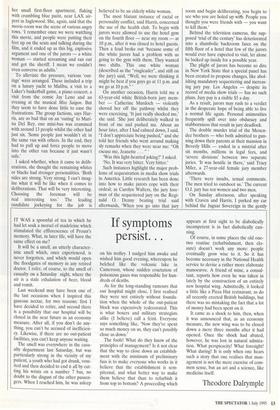If symptoms persist.. .
IT WAS a spoonful of tea in which he had let soak a morsel of madeleine which stimulated the efflorescence of Proust's memory. What, in later life, will have the same effect on me?
It will be a smell, an utterly character- istic smell which, once experienced, is never forgotten, and which would open the floodgates of memory in any retired doctor. I refer, of course, to the smell of casualty on a Saturday night, where the air is a stale exhalation of beer, blood and vomit.
Last weekend may have been one of the last occasions when I inspired this gaseous nectar, for two reasons: first I have decided to retire, and second there is a possibility that our hospital will be . closed in the near future as an economy measure. After all, if you don't do any- thing, you can't be accused of inefficien- cy. Likewise, if there are no out-patient facilities, you can't keep anyone waiting.
The smell was everywhere in the casu- alty department last Saturday, but was particularly strong in the vicinity of my patient, a youth who had got drunk, vom- ited and then decided to end it all by cut- ting his wrists on a number 7 bus, no doubt to the disgust of the other passen- gers. When I reached him, he was asleep on his trolley. I nudged him awake and wished him good evening, whereupon he belched like the volcanic lake in Cameroon, whose sudden eructation of poisonous gases was responsible for hun- dreds of deaths.
As for the long-standing rumours that our hospital might close, I first realised they were not entirely without founda- tion when the whole of the out-patient block was expensively redecorated. This is what boxers and military strategists alike (I believe) call a feint. Everyone says something like, 'Now they've spent so much money on us, they can't possibly close us down.'
The fools! What do they know of the principles of management? Is it not clear that the way to close down an establish- ment with the minimum of preliminary fuss is to make everyone who works in it believe that the establishment is sem- piternal, and what better way to make them believe that than to refurbish it from top to bottom? A proceeding which appears at first sight to be diabolically incompetent is in fact diabolically cun- ning.
Of course, in some places the old one- two routine (refurbishment, then clo- sure) doesn't work any more: people eventually grow wise to it. So it has become necessary in the National Health service to devise a rather more elaborate manoeuvre. A friend of mine, a consul- tant, reports how even he was taken in lately by the construction of an entirely new hospital wing. Admittedly, it looked a little like a Pizza Hut restaurant, as do all recently erected British buildings, but there was no mistaking the fact that a lot of money had been spent on it.
It came as a shock to him, then, when it was announced that, as an economy measure, the new wing was to be closed down a mere three months after it had opened. Once the shock had abated, however, he was lost in natural admira- tion. What perspicacity! What foresight! What daring! It is only when one hears such a story that one realises that man- agement is not the mere exercise of com- mon sense, but an art and a science, like medicine itself.
Theodore Dalrymple


































































 Previous page
Previous page